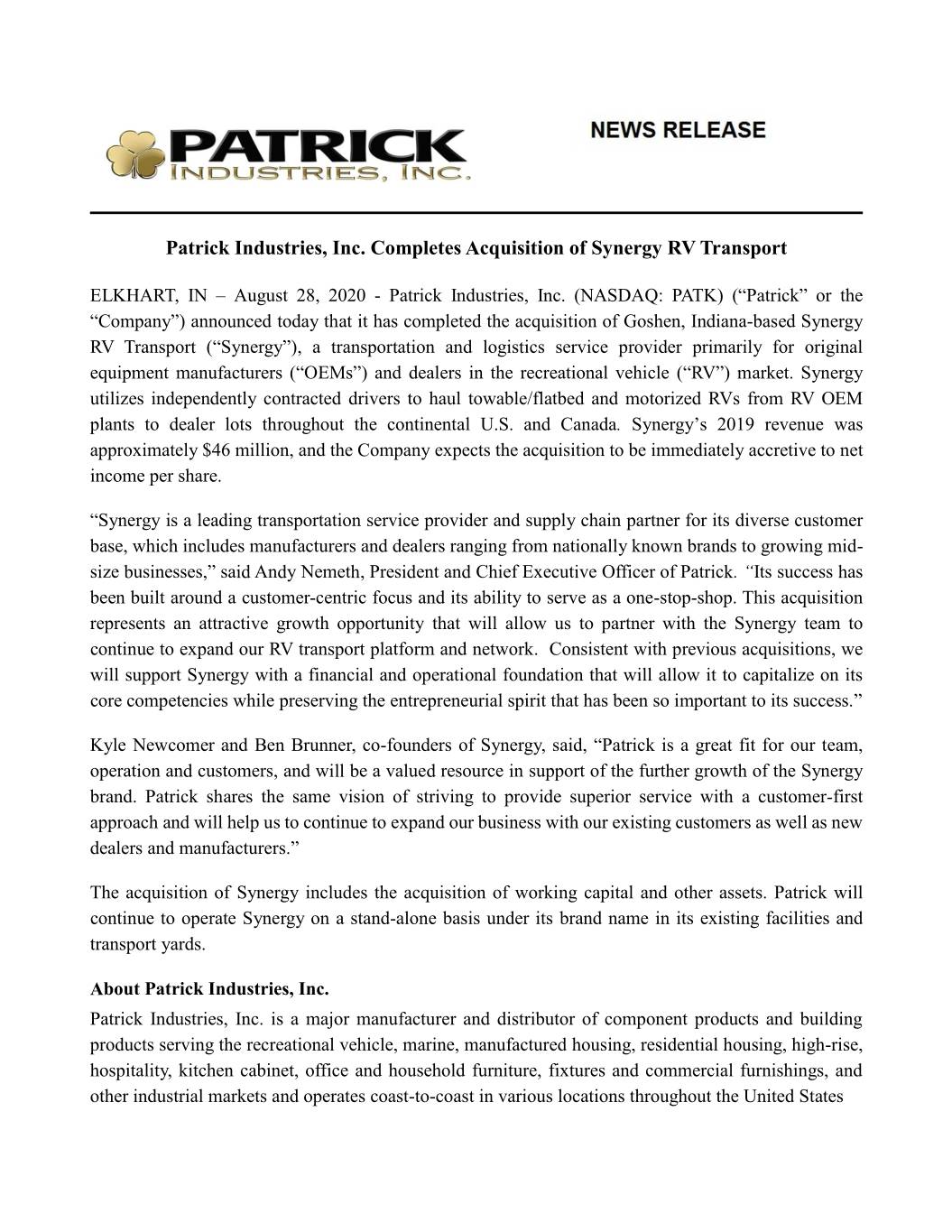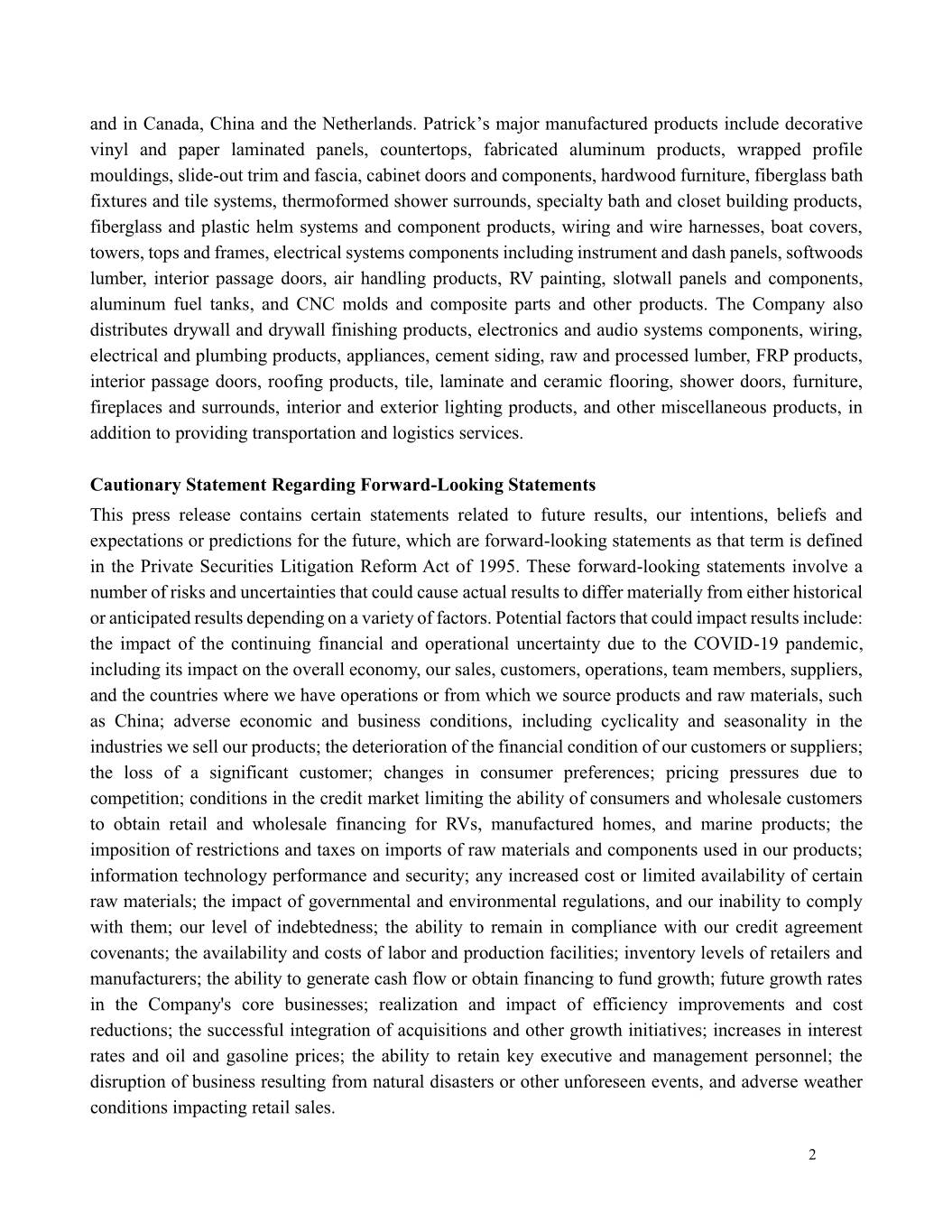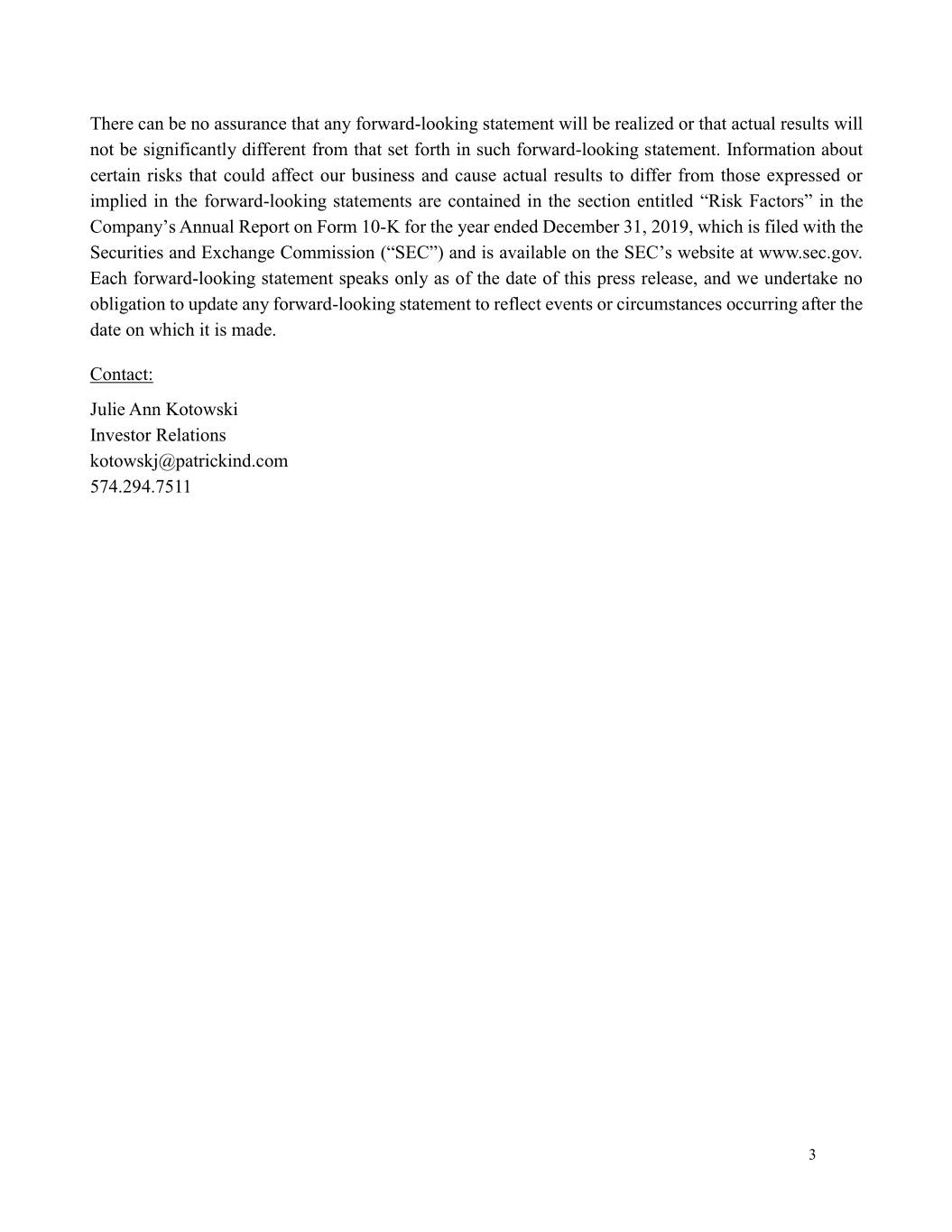EXHIBIT 99.1
Published on August 28, 2020

Patrick Industries, Inc. Completes Acquisition of Synergy RV Transport ELKHART, IN – August 28, 2020 - Patrick Industries, Inc. (NASDAQ: PATK) (“Patrick” or the “Company”) announced today that it has completed the acquisition of Goshen, Indiana-based Synergy RV Transport (“Synergy”), a transportation and logistics service provider primarily for original equipment manufacturers (“OEMs”) and dealers in the recreational vehicle (“RV”) market. Synergy utilizes independently contracted drivers to haul towable/flatbed and motorized RVs from RV OEM plants to dealer lots throughout the continental U.S. and Canada. Synergy’s 2019 revenue was approximately $46 million, and the Company expects the acquisition to be immediately accretive to net income per share. “Synergy is a leading transportation service provider and supply chain partner for its diverse customer base, which includes manufacturers and dealers ranging from nationally known brands to growing mid- size businesses,” said Andy Nemeth, President and Chief Executive Officer of Patrick. “Its success has been built around a customer-centric focus and its ability to serve as a one-stop-shop. This acquisition represents an attractive growth opportunity that will allow us to partner with the Synergy team to continue to expand our RV transport platform and network. Consistent with previous acquisitions, we will support Synergy with a financial and operational foundation that will allow it to capitalize on its core competencies while preserving the entrepreneurial spirit that has been so important to its success.” Kyle Newcomer and Ben Brunner, co-founders of Synergy, said, “Patrick is a great fit for our team, operation and customers, and will be a valued resource in support of the further growth of the Synergy brand. Patrick shares the same vision of striving to provide superior service with a customer-first approach and will help us to continue to expand our business with our existing customers as well as new dealers and manufacturers.” The acquisition of Synergy includes the acquisition of working capital and other assets. Patrick will continue to operate Synergy on a stand-alone basis under its brand name in its existing facilities and transport yards. About Patrick Industries, Inc. Patrick Industries, Inc. is a major manufacturer and distributor of component products and building products serving the recreational vehicle, marine, manufactured housing, residential housing, high-rise, hospitality, kitchen cabinet, office and household furniture, fixtures and commercial furnishings, and other industrial markets and operates coast-to-coast in various locations throughout the United States

and in Canada, China and the Netherlands. Patrick’s major manufactured products include decorative vinyl and paper laminated panels, countertops, fabricated aluminum products, wrapped profile mouldings, slide-out trim and fascia, cabinet doors and components, hardwood furniture, fiberglass bath fixtures and tile systems, thermoformed shower surrounds, specialty bath and closet building products, fiberglass and plastic helm systems and component products, wiring and wire harnesses, boat covers, towers, tops and frames, electrical systems components including instrument and dash panels, softwoods lumber, interior passage doors, air handling products, RV painting, slotwall panels and components, aluminum fuel tanks, and CNC molds and composite parts and other products. The Company also distributes drywall and drywall finishing products, electronics and audio systems components, wiring, electrical and plumbing products, appliances, cement siding, raw and processed lumber, FRP products, interior passage doors, roofing products, tile, laminate and ceramic flooring, shower doors, furniture, fireplaces and surrounds, interior and exterior lighting products, and other miscellaneous products, in addition to providing transportation and logistics services. Cautionary Statement Regarding Forward-Looking Statements This press release contains certain statements related to future results, our intentions, beliefs and expectations or predictions for the future, which are forward-looking statements as that term is defined in the Private Securities Litigation Reform Act of 1995. These forward-looking statements involve a number of risks and uncertainties that could cause actual results to differ materially from either historical or anticipated results depending on a variety of factors. Potential factors that could impact results include: the impact of the continuing financial and operational uncertainty due to the COVID-19 pandemic, including its impact on the overall economy, our sales, customers, operations, team members, suppliers, and the countries where we have operations or from which we source products and raw materials, such as China; adverse economic and business conditions, including cyclicality and seasonality in the industries we sell our products; the deterioration of the financial condition of our customers or suppliers; the loss of a significant customer; changes in consumer preferences; pricing pressures due to competition; conditions in the credit market limiting the ability of consumers and wholesale customers to obtain retail and wholesale financing for RVs, manufactured homes, and marine products; the imposition of restrictions and taxes on imports of raw materials and components used in our products; information technology performance and security; any increased cost or limited availability of certain raw materials; the impact of governmental and environmental regulations, and our inability to comply with them; our level of indebtedness; the ability to remain in compliance with our credit agreement covenants; the availability and costs of labor and production facilities; inventory levels of retailers and manufacturers; the ability to generate cash flow or obtain financing to fund growth; future growth rates in the Company's core businesses; realization and impact of efficiency improvements and cost reductions; the successful integration of acquisitions and other growth initiatives; increases in interest rates and oil and gasoline prices; the ability to retain key executive and management personnel; the disruption of business resulting from natural disasters or other unforeseen events, and adverse weather conditions impacting retail sales. 2

There can be no assurance that any forward-looking statement will be realized or that actual results will not be significantly different from that set forth in such forward-looking statement. Information about certain risks that could affect our business and cause actual results to differ from those expressed or implied in the forward-looking statements are contained in the section entitled “Risk Factors” in the Company’s Annual Report on Form 10-K for the year ended December 31, 2019, which is filed with the Securities and Exchange Commission (“SEC”) and is available on the SEC’s website at www.sec.gov. Each forward-looking statement speaks only as of the date of this press release, and we undertake no obligation to update any forward-looking statement to reflect events or circumstances occurring after the date on which it is made. Contact: Julie Ann Kotowski Investor Relations kotowskj@patrickind.com 574.294.7511 3